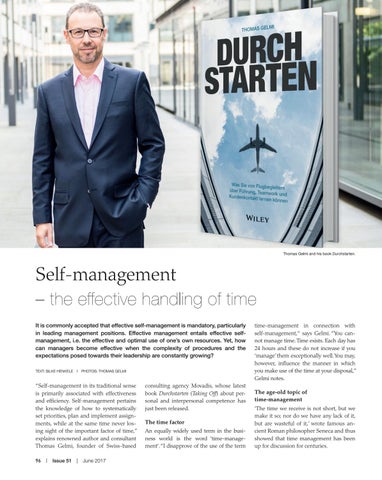Thomas Gelmi and his book Durchstarten.
Self-management
– the effective handling of time It is commonly accepted that effective self-management is mandatory, particularly in leading management positions. Effective management entails effective selfmanagement, i.e. the effective and optimal use of one’s own resources. Yet, how can managers become effective when the complexity of procedures and the expectations posed towards their leadership are constantly growing?
TEXT: SILKE HENKELE I PHOTOS: THOMAS GELMI
“Self-management in its traditional sense is primarily associated with effectiveness and efficiency. Self-management pertains the knowledge of how to systematically set priorities, plan and implement assignments, while at the same time never losing sight of the important factor of time,” explains renowned author and consultant Thomas Gelmi, founder of Swiss-based 96 | Issue 51 | June 2017
consulting agency Movadis, whose latest book Durchstarten (Taking Off) about personal and interpersonal competence has just been released. The time factor An equally widely used term in the business world is the word ‘time-management‘. “I disapprove of the use of the term
time-management in connection with self-management,“ says Gelmi. “You cannot manage time. Time exists. Each day has 24 hours and these do not increase if you ‘manage’ them exceptionally well. You may, however, influence the manner in which you make use of the time at your disposal,” Gelmi notes. The age-old topic of time-management ‘The time we receive is not short, but we make it so; nor do we have any lack of it, but are wasteful of it,’ wrote famous ancient Roman philosopher Seneca and thus showed that time management has been up for discussion for centuries.
